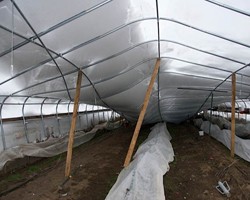Salvaging Your Greenhouse After a Heavy Snow Storm

A quick checklist covering potential hazards and steps to take to salvage your greenhouse after a heavy snow storm.
Be aware of potential hazards:
• Sliding snow or ice
• Falling glassAgri:
• Broken frame members
• Severed electrical wires
• Leaking fuel oil or gas
Shut off utilities:
• Disconnect power supply
• Shut of gas supply
• Turn of main water supply
Minimum structural damage:
• Take photos
• Prop up greenhouse frame to prevent further collapse
• Add additional bracing (diagonal at corners)
• Check and tighten frame connections
• Repair glazing
• Close doors and vents
• Open drain pipes
• Provide temporary heat to keep plants from freezing
• Check and repair heating/electrical/water systems
Major structural damage:
• Take photos
• Support frame members for safe entry
• Cut poly if necessary to reduce load on structure
• Clear aisles
• Remove plants to temporary structures or alternate location
• Drain water system
• Cover heating/cooling and materials handling equipment with tarps
Snow removal:
It can be very expensive to remove the snow. You also have to have space for it. If the snow is light, there is not much danger of further collapse. If it is heavy, some growers found that as it settled, melted and refroze, it formed a cocoon next to the greenhouse and didn’t add a lot of pressure. Removing it may cause more damage. If you need the light for the plants, then the snow will have to be removed.
Contact the insurance company.
Rent equipment to remove snow if necessary. Also rent to replace damaged heating/cooling equipment.
CHECKLIST: Salvaging Your Greenhouse After a Heavy Snow Storm (pdf; 73KB)

Upcoming Events
African Eggplant Participatory Breeding Kick-Off
March 5, 2026
Join us to learn about the Cornell African Eggplant Research Project and learn how you can participate! African eggplant, also known as Bitterball, Garden Egg, Kittley and other names, is an important crop for many members of our community with heritage from regions such as sub-Saharan Africa, Southeast Asia, and Brazil. Since 2024, the Cornell African Eggplant Research Project has been collaborating with growers and community partners across New York to develop high-quality varieties adapted to the Northeast U.S. In this meeting, we will share information about growing and preparing African eggplant, highlight our research to date, and invite partners to collaborate with us in our 2026 participatory breeding and variety selection efforts.
COST: FREE! You must pre-register to receive the Zoom link.
Managing the Invasive Swede Midge Webinar
March 6, 2026
Swede midge is an invasive fly that causes serious economic losses to brassica crops. Due to its small size and hidden feeding habits, swede midge is often called an "invisible pest" and damage may be misdiagnosed. In this webinar, we will review the swede midge life cycle and crop damage symptoms, current management recommendations, new research findings, and highlights from on-farm case studies with a focus on organic management.
1.75 DEC pesticide recertification credits in categories 1a, 10, and 23.
Good Agricultural Practices (GAPs) Food Safety Training
March 10, 2026
Newark, NY
Learn about food safety on the farm! This event hosted by the Cornell Vegetable Program, Cornell Lake Ontario Fruit Team, CCE Wayne County, and the NYS Department of Agriculture, will cover good agricultural practices (GAPs) to help reduce the risk of microbial contamination on the farm, keeping food and consumers safe.


































